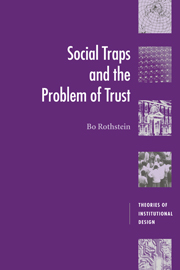Book contents
- Frontmatter
- Contents
- List of tables and figures
- Acknowledgements
- 1 Reflections after a long day in Moscow
- 2 On the rational choice of culture
- 3 On the theory and practice of social capital
- 4 Social capital in the social democratic welfare state
- 5 How is social capital produced?
- 6 The problem of institutional credibility
- 7 Trust and collective memories
- 8 The transition from mistrust to trust
- 9 The conditions of trust and the capacity for dialog
- Bibliography
- Index
9 - The conditions of trust and the capacity for dialog
Published online by Cambridge University Press: 22 September 2009
- Frontmatter
- Contents
- List of tables and figures
- Acknowledgements
- 1 Reflections after a long day in Moscow
- 2 On the rational choice of culture
- 3 On the theory and practice of social capital
- 4 Social capital in the social democratic welfare state
- 5 How is social capital produced?
- 6 The problem of institutional credibility
- 7 Trust and collective memories
- 8 The transition from mistrust to trust
- 9 The conditions of trust and the capacity for dialog
- Bibliography
- Index
Summary
There are many different ways to understand the project of political science. One is that political science encompasses the use of newer and more refined methods to mine reality for improved – in the sense of truer – pictures of how the political aspects of society work. Another is that it should be regarded more as a philosophical cultural achievement that carries on the discussion of political government that, as we know it, was started nearly 2,500 years ago by Plato, Aristotle, and their contemporaries. In the latter case, the achievement consists of, like the stubborn peasant, plowing these fields again and again to keep them fertile for new generations so that the classical insights into the problems and opportunities of political government do not disappear into the dustbin of history. Certainly, now and then undergrowth of a new kind must also be cleared away (cf. Barry 2000). By plowing these furrows over and over again we make it possible for new insights to grow, on isolated occasions in history, about how humanity should avoid falling into new disastrous wars of “all against all” or the authoritarian Leviathan state – the two alternatives given us by Thomas Hobbes.
The division within the discipline between these alternative understandings of the political science project is often doctrinaire. Those devoted to the normative issues are, at best, ignorant of the advances of empirical research. The eternal questions are the same, wholly apart from them.
- Type
- Chapter
- Information
- Social Traps and the Problem of Trust , pp. 201 - 211Publisher: Cambridge University PressPrint publication year: 2005

